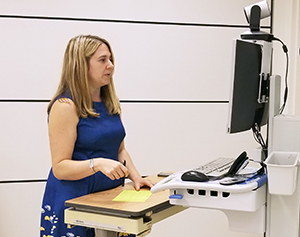Current Research Projects
Explore a Sampling of Our Active Research Projects
 Our research focuses on how telehealth programs can:
Our research focuses on how telehealth programs can:
-
Improve patient outcomes.
-
Increase patient access to care, especially in rural or underserved communities.
-
Make health care more cost effective.
-
Boost both patient and clinician satisfaction.
-
Improve overall quality of care.
Improving Family-Centered Pediatric Trauma Care: The Standard of Care versus the Virtual Pediatric Trauma Center
Principal Investigator: James Marcin, M.D., MPH
Co-Investigators: Nathan Kuppermann, M.D., MPH, FAAP, FACEP; and Joseph Galante, M.D.
Funding Agency: Patient-Centered Outcomes Research Institute (PCORI)
Award: $4,199,464
Period: June 1, 2020-May 31, 2023
The study will compare the current standard of pediatric trauma care with the virtual pediatric trauma center model. The current standard calls for patients to be transferred to a level I pediatric trauma center. In the virtual pediatric trauma center model, telemedicine such as videoconferencing brings the expertise of a level I pediatric trauma center to any hospital emergency department. The project will evaluate the patient and family experience of both models, as well as measure stress, examine access to health care services needed and weigh out-of-pocket costs following the injury of a child.
School-Based Tele-Physiatry Assistance for Rehabilitative and Therapeutic Services (STARS)
Principal Investigators: James Marcin, M.D., MPH
Co-Investigator: Loren Davidson, M.D.; Maya Evans, M.D.; and Shawna Arsenault, M.D.
Funding Agency: Agency for Healthcare Research and Quality
Award: $2 million
Period: September 30, 2017 to July 31, 2022
This program provides critical physiatry care for children with cerebral palsy, spina bifida, spinal cord injuries and other disabilities using telehealth. It involves installing secure teleconferencing equipment in schools in San Joaquin, Butte and Lake counties. Physiatrists remotely guide screening and write the appropriate prescriptions and referrals. In addition to providing care, the grant also supports research to determine which approaches provide the greatest benefit for children and their families. The study examines three cohorts: physiatrists providing care in person; non-physiatrists providing care in person; and physiatrists using telemedicine. The group will assess whether telehealth improves quality of care, increases patient-centeredness and reduces costs.
Optimizing Pregnancy and Infant Outcomes in Drug (OPIOID) Addiction
Principal Investigators: Shannon Clark, M.D., and Kara Kuhn-Riordon, M.D.
Co-Investigator: James Marcin, M.D., MPH
Funding Agency: Health Resources and Services Administration
Award: Up to $200,000
Period: Sept. 30, 2020-Sept. 29, 2023
The goal of this one-year planning project is to establish a consortium of five rural hospitals to work collaboratively with opioid specialists at an academic hospital to develop a telementoring and capacity building program (based on the Echo® program) aimed at increasing rural providers’ ability to care for pregnant and parenting women with Opioid Use Disorder (OUD) and their newborns. The hospitals included in the consortium are on the front-lines of the rural opioid epidemic, serving rural and underserved communities in both Northern California and Nevada. Efforts will be focused on increasing and improving treatment and recovery practices in these rural communities.
SVS Foundation and ACS Mentored Patient-Oriented Research Career Development Award (K23)
Evaluating Implementation of Comprehensive Assessment and Telemedicine Consultation to Prevent Amputations for Patients with Lower Extremity Ulcers in Rural Health Clinics
Principal Investigator: Misty Humphries, M.D.
Funding Agencies: Society for Vascular Surgery Foundation and American College of Surgeons
This research project uses telehealth to remote clinics to increase access and quality for patients with lower extremity vascular insufficiency and diabetes.


